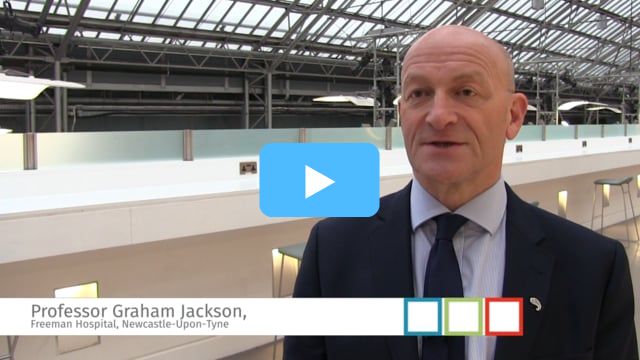Advertisment
Bridging the gap between clinical trial results and real-world myeloma practices

Professor Graham Jackson (Newcastle, UK) gives an overview of his presentation on real world management of myeloma patients in the UK, with comments from Professor Sagar Lonial (Atlanta, USA). Professor Jackson who discusses deliverability of different regimens and whether this affects real world outcomes.
Interviewer: Hannah Chatfield. Article: Maria Dalby.
While response rates and survival outcomes are improving steadily in clinical studies, there is still a considerable gap between what can be achieved in the highly selective and well-arranged world of a randomised controlled clinical trial and the unwieldy reality of routine MM care. Professor Graham Jackson (Newcastle upon Tyne Hospitals NHS Trust) highlighted some key issues that to date have not been fully addressed in clinical studies in MM, and discussed how the gap between studies and clinical practice could be bridged.
There has been a steady improvement in overall survival in MM in recent decades; in the UK, nearly half of patients diagnosed with MM are still alive after five years, and one patient in three survive for ten years or more after diagnosis. The UK Myeloma trial series has made a considerable difference for MM survivorship – each successive trial has had an impact on patient survival. An important improvement in survival has been among patients presenting with renal failure at MM diagnosis, thanks to the introduction of bortezomib. However, the fact remains that a proportion of patients diagnosed with MM will die within a year of diagnosis, and this proportion has remained relatively high in recent years despite advances in diagnosis and drug treatment, especially among old and frail patients but also among those who are young and fit. Professor Jackson speculated that this early drop-off in survival largely represents patients who for one reason or another are not eligible for clinical trials. In fact, a number of MM patient populations are known to be underrepresented in clinical trials, including patients with comorbidities or advanced disease, elderly and frail patients, patients from low socio-economic backgrounds, and patients from ethnic minorities – all characteristics that have been linked to poorer outcomes in MM.
In the natural course of MM, the disease will progress in relapses and remissions, with declining bone marrow function and increasing cumulative treatment toxicity over time. At each new line of therapy the depth and duration of the treatment response, and thus the survival prognosis will diminish, and at each relapse accumulated comorbidities will leave patients increasingly intolerant to therapy. Professor Jackson stressed the importance of maximising outcomes to minimise the loss of patients from each line of therapy. A key element of this is upgrading how the response is measured in clinical practice. In randomised clinical trials, MRD negativity has come to replace CR and stringent CR as the most relevant endpoint in terms of depth of response to MM treatment. A recent meta-analysis showed that achieving MRD negativity is associated with significantly prolonged PFS also in patients who achieved a complete response.1However, despite these findings MRD is not yet used to evaluate response in routine clinical practice.
The best translation of clinical trial data into clinical practice is, of course, when several large studies can be combined into a meta-analysis, the results of which can then be confirmed by real-world data. As an example of such a high-quality translation Professor Jackson highlighted maintenance therapy with lenalidomide following ASCT. The Myeloma XI study showed that lenalidomide maintenance improved PFS from 30 to 57 months compared with observation alone, with a hazard ratio (HR) of 0.48 (95% CI 0.40, 0.58; p<0.0001).2 Although the PFS benefit with lenalidomide maintenance was seen in both MRD-negative and MRD-positive patients, those who were MRD negative at six months into maintenance therapy had significantly longer PFS than those who were MRD positive at six months (median PFS not reached versus 24 months; HR=0.22; 95% CI 0.14, 0.34; p<0.0001). Overall the survival benefit of lenalidomide has been demonstrated in a total of four randomised controlled clinical studies. A meta-analysis of these studies comprising a total of more than 1,200 patients found a median PFS of 52.8 months with lenalidomide maintenance versus 23.5 months with placebo/observation (HR=0.48; 95% CI 0.41, 0.55).3 Data from the unselected Connect MM registry in the United States has shown that this finding is borne out in real-world clinical practice, and Professor Jackson took the opportunity to describe it as “a national scandal” that lenalidomide maintenance therapy is not yet available in the UK.
Frailty is known to affect survival outcomes in MM, yet frail elderly patients are nearly always excluded from randomised clinical trials. The planned Myeloma XIV study has been designed to bridge this gap by including elderly frail and non-frail patients who will received induction therapy with ixazomib and Rd (IRd) that is either not adjusted for frailty at all or dose-adjusted according to the patient’s Frailty Index score, followed by maintenance therapy with lenalidomide alone or in combination with ixazomib. Professor Jackson stressed that in a world where clinical research is becoming increasingly expensive, academic clinical trials have a vital role to play in terms of applying wider inclusion criteria and thus offering a chance of improving outcomes for the entire MM patient population, rather than merely meeting regulatory or commercial objectives.
References
- Munshi NC, Avet-Loiseau H, Rawstron AC, et al. Association of Minimal Residual Disease With Superior Survival Outcomes in Patients With Multiple Myeloma: A Meta-analysis. JAMA Oncol 2017;3:28-35.
- Jackson GH, Davies FE, Pawlyn C, et al. Lenalidomide maintenance versus observation for patients with newly diagnosed multiple myeloma (Myeloma XI): a multicentre, open-label, randomised, phase 3 trial. The Lancet Oncology 2019;20:57-73.
- McCarthy PL, Holstein SA, Petrucci MT, et al. Lenalidomide Maintenance After Autologous Stem-Cell Transplantation in Newly Diagnosed Multiple Myeloma: A Meta-Analysis. J Clin Oncol 2017;35:3279-3289.





